We develop foundational and applied techniques grounded in artificial intelligence, logics, and formal methods, to design, analyse, enact, and maintain intelligent information systems that combine data, information, knowledge, and processes.
The KRDB research area for Knowledge-based Artificial Intelligence has a world-leading expertise in several scientific areas, each of them capturing innovative aspects of Knowledge Representation and Advanced Database technologies:
- Knowledge Representation: the focus is on well-established approaches such as Description Logics, novel approaches like Knowledge Graphs, and their role as ontology languages.
- Description Logics provide a logical foundation for expressing knowledge, along with mechanisms for inference and query answering. Their rigorous semantics make them suitable for applications ranging from semantic web to natural language processing.
- Knowledge Graphs have emerged as a prominent paradigm in Knowledge Representation, leveraging graph structures to model and connect diverse entities and their relationships. Knowledge Graphs excel in capturing real-world knowledge from heterogeneous sources and enable powerful semantic querying and inference capabilities. With the rise of the semantic web and advancements in machine learning, Knowledge Graphs have become instrumental in various domains, including search engines, recommendation systems, and intelligent assistants.
- Both Description Logics and Knowledge Graphs serve as ontology languages, providing vocabularies and formalisms for defining shared conceptualizations of domains. Ontologies play a crucial role in facilitating interoperability and semantic integration across different systems and domains by providing a mutual understanding of the entities and relationships within a specific domain. By employing Description Logics or building Knowledge Graphs, researchers and practitioners can create expressive ontologies that enhance data interoperability, enable more intelligent decision-making processes, and support advanced applications such as knowledge-based reasoning and semantic search.
- Knowledge and Data: the focus is on the impact of knowledge-based AI to data-intensive domains, and more specifically on ontology-based data access, conceptual modelling, knowledge-based data management, knowledge-based data science, neuro-symbolic approaches to learning.
- Ontology-based Data Access combines ontological representations with data sources to enable more expressive and flexible querying capabilities. By utilizing ontologies to capture domain knowledge, ontologies bridge the semantic gap between heterogeneous data sources and provide users with intuitive and meaningful ways to access and manipulate data. This approach has wide-ranging applications in areas like data integration, semantic web, and biomedical informatics, where traditional relational databases may not suffice.
- Conceptual modelling involves creating high-level, abstract representations of domains to facilitate system design, analysis, and communication among stakeholders. Knowledge-based AI techniques contribute to conceptual modelling by enabling richer and more precise representations of domain semantics. By incorporating ontological constructs and reasoning mechanisms, conceptual models become more interpretable and adaptable, leading to better-designed systems and improved decision-making processes.
- Knowledge-based Data Management focuses on leveraging knowledge representation and reasoning to enhance data storage, retrieval, and manipulation tasks. By encoding domain knowledge into the data management process, systems can achieve more intelligent data handling, such as automatic data classification, schema mapping, and semantic query optimization. This approach improves data quality, reduces redundancy, and enhances the scalability and interoperability of data-intensive applications.
- The impact of Knowledge-based AI on Data Science is profound, as it enables more advanced and interpretable data analytics and machine learning techniques. By integrating domain knowledge into data analysis pipelines, researchers can develop more robust models, interpret their predictions more effectively, and generate actionable insights with higher confidence. Knowledge-based AI also facilitates Explainable AI, which aims to make AI systems more transparent and understandable to users by providing explanations for their decisions and behaviours.
- A novel research effort that KRDB is investing more in is Neuro-symbolic approaches to support Explainable AI. Neuro-symbolic approaches combine the strengths of symbolic reasoning with the learning capabilities of neural networks to create more interpretable and transparent AI models. By integrating symbolic knowledge representation with neural network architectures, researchers can develop AI systems that not only perform well but also provide explanations for their outputs, increasing trust and usability in real-world applications. This investment aligns with the growing demand for Explainable AI solutions in critical domains such as healthcare, finance, and autonomous systems.
- Knowledge in Time and Processes: the focus includes temporal and action languages, process mining and analysis, predictive process monitoring, and AI for process science.
- Temporal and Action Languages provide formalisms for representing and reasoning about temporal information and actions within dynamic systems. These languages enable the specification of temporal constraints, event sequences, and causality relations, facilitating the modelling and analysis of processes that evolve over time. By employing temporal logic and action languages, researchers can capture complex temporal phenomena and reason about the behaviour of systems in a formal and expressive manner.
- Process Mining and Analysis focuses on extracting knowledge from event logs and process data to discover, monitor, and improve business processes. By applying data mining and machine learning techniques to event data, researchers can uncover process models, identify process variations and bottlenecks, and assess process performance and compliance. Process mining plays a crucial role in business process management, enabling organizations to optimize their operations, streamline workflows, and enhance productivity.
- Predictive Process Monitoring leverages machine learning and predictive analytics to forecast the future behaviour of processes based on historical data. By training predictive models on event logs, researchers can anticipate process outcomes, detect deviations from expected behaviour, and proactively intervene to prevent or mitigate potential issues. Predictive process monitoring enables proactive decision-making and resource allocation, leading to more efficient and reliable process management.
- Artificial Intelligence for Process Science encompasses a wide range of AI techniques and methodologies applied to the study and analysis of processes. This includes techniques such as automated planning, scheduling, and optimization, as well as knowledge-based reasoning and decision support systems tailored to process-oriented domains. AI for process science aims to develop intelligent systems capable of understanding, reasoning about, and autonomously managing complex processes in diverse application areas, including manufacturing, healthcare, logistics, and service industries.
- Knowledge and Cognition: the focus is on understanding how humans acquire, represent, and use knowledge, and the computational aspects of these cognitive processes: computational creativity, foundational ontologies, knowledge-based natural language processing, and multi-modal interfaces.
- Creativity research focuses on uncovering the mechanisms underlying human creativity and developing computational models that can mimic or augment creative processes. By studying how humans generate novel ideas, solutions, and artifacts, researchers aim to design intelligent systems capable of creativity in various domains, from art and music to engineering and scientific discovery.Foundational Ontologies provide formal frameworks for organizing and categorizing knowledge in a systematic and interoperable manner. These ontologies establish common vocabularies and conceptual structures that underpin more specialized domain ontologies, enabling semantic interoperability and knowledge sharing across diverse applications and domains.
- Natural Language Processing (NLP): in addition to studying linguistic phenomena, our research integrates linguistic knowledge with semantics, pragmatics, and domain-specific knowledge to improve the understanding and generation of natural language text. By leveraging ontological and semantic resources, researchers can enhance tasks such as information extraction, question answering, and text summarization, leading to more accurate and interpretable NLP systems. The KRDB macro-area has a long-standing research expertise on these topics.
- Multi-Modal Interfaces involve designing interactive systems that can process and respond to inputs from multiple modalities, such as in video question answering via natural language, visual search, or controlled natural language. These interfaces enable more natural and intuitive interactions between humans and machines. Strengthening research in multi-modal interfaces involves developing algorithms, architectures, and interaction techniques that can effectively integrate information from different modalities to support tasks such as communication, navigation, and content consumption.
The coverage of these scientific areas is quite vast, and involves both theoretical and applicative skills: the appropriate balance between these two aspects can provide a unique added value to the research area. The goal of the KRDB research area is to let practitioners to apply foundational results, and push theoreticians to understand the complex nature of the real issues. This can be achieved together with a research group which has a critical mass to include a variety of perspectives in the entire range from theory to practice. The interdisciplinary aspects of this research area are also crucial: together with the theory vs practice aspect, these are system aspects, methodological aspects, interaction and communication aspects, usability aspects, complexity aspects, correctness aspects, efficiency aspects, deployability aspects.
“We are drowning in information but starved for knowledge” — John Naisbitt, Megatrends
Some activities @ KRDB
Data preparation at KRDB
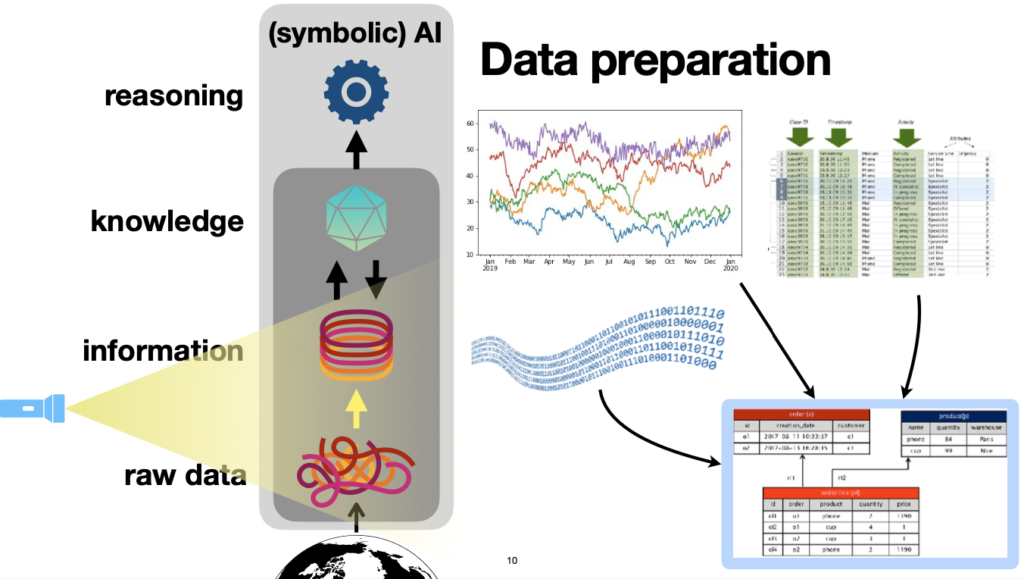
Research activities:
- Reverse Engineering Conceptual Models from databases, data streams, semi-structured documents
- Data Integration and Interoperability
- Semantic Web technologies
- Analysis of data quality
- Study of novel data models for diverse raw data sources
Collaborations: European Space Agency, Max Planck Institute for Informatics, Fraunhofer IIS, Siemens, Xerox PARC Palo Alto, TU Dresden, Bremen, FBK, Roma Sapienza, Manchester, Oxford, Rutgers, Waterloo Canada
Applications: interoperability for space systems, construction, legal knowledge, SME support, Smart City
Selected projects:
- EU Ontorule — ONTOlogies meet business RULEs. Developing a methodological, theoretical and technological platform for the acquisition, management, and use of ontologies and business rules from fact data. Partners: TU Wien, Univ. Innsbruck, Open University.
- ESA Reasoners — Semantic Modelling and Semantic Interoperability. Design of a conceptual modelling tool extending Microsoft Visual Studio to support semantic integration and interoperability in space systems engineering. Partner: European Space Research and Technology Centre (ESTEC) of the European Space Agency (ESA).
Conceptual modelling at KRDB
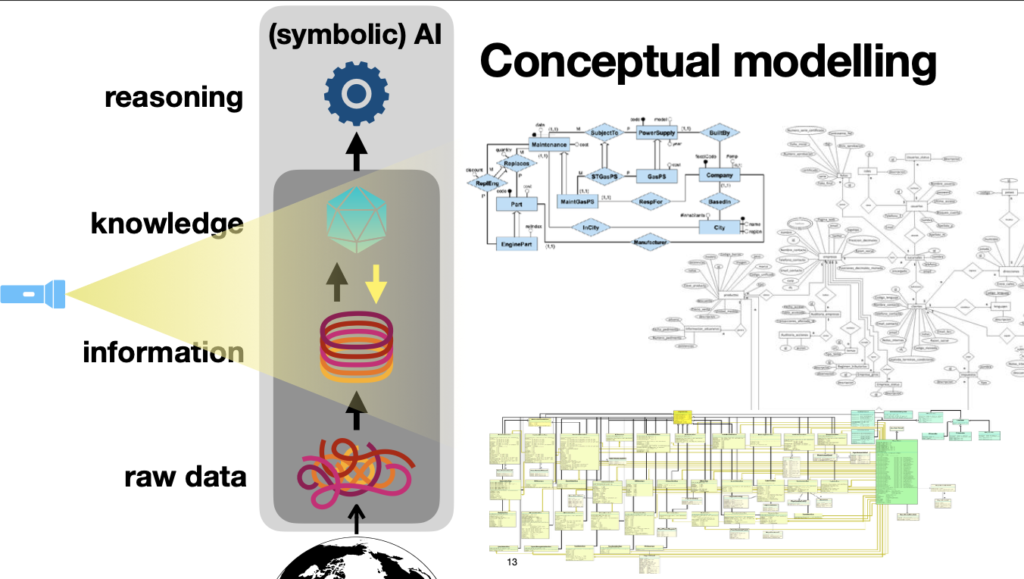
Research activities:
- Well-founded conceptual and cognitive modelling methodologies and tools, also grounded on direct access to data
- Analysis of ontological and cognitive adequacy of conceptual models
- Theoretical foundations of modelling temporally changing data streams
- Conceptual Modelling standards (W3C, OMG)
Collaborations: NOI TechPark, CNR-ISTC, FBK, Univ. Udine, Roma Sapienza, Bremen, Magdeburg, TU Dresden, Birkbeck, Liverpool, Edinburgh, Manchester, Oxford, Rutgers, Waterloo Canada
Applications: database design and software engineering, tourism, natural language understanding
Selected projects:
- EU COINVENT — Concept Invention Theory. Advancing the formal understanding of creativity by developing a computationally feasible, cognitively-inspired formal model of concept invention.
- AlpineBits Destination Data. Technology supporting the exchange of data on the tourism domain (with Dolomiti Superski) based on well founded semantic conceptualisations. Partners: NOI TechPark, AlpineBits Alliance.
Semantic data access at KRDB
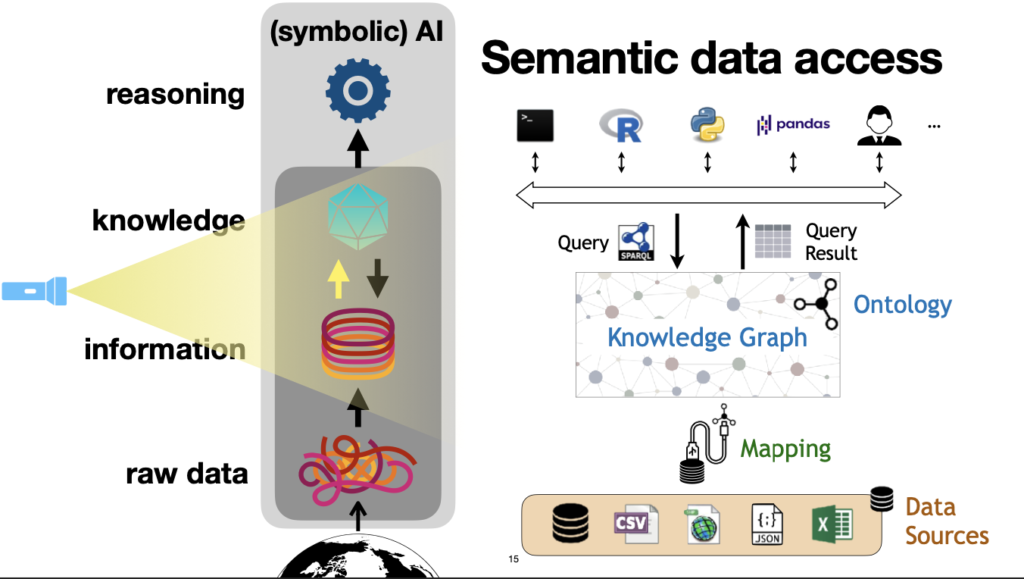
Research activities:
- Theoretical foundations and W3C standards for virtual knowledge graph (VKG) framework
- Development of VKG open-source system Ontop (with wide industrial adoption)
- Extensions for geo-spatial data, temporal data, web APIs, graph databases
Collaborations: Sapienza Rome, TU Wien, TU Munich, Univ. Oslo, Bergen, Trondheim, Umeå, Birkbeck London, UPC Barcelona
Applications: energy, oil & gas, public administrations, scientific data, bio & medicine
Spin-off: Ontopic, a spin-off of the Free University of Bozen-Bolzano to develop innovative products and services in the field of data integration and data access through Virtual Knowledge Graphs.

Selected projects:
- EU FP7 Optique — Scalable End-user Access to Big Data. Developed techniques and tools based on semantic technologies for integrated access to heterogeneous data. 5 academic and 4 industrial partners (including Siemens and Statoil).
- FESR IDEE — Integrating Data for Energy Efficiency. Developed a technological infrastructure for the integration of energy-related data about buildings. Partners: Alperia, R3GIS, Municipality of Merano provides use-case — collaboration ongoing.
BPM and process mining at KRDB
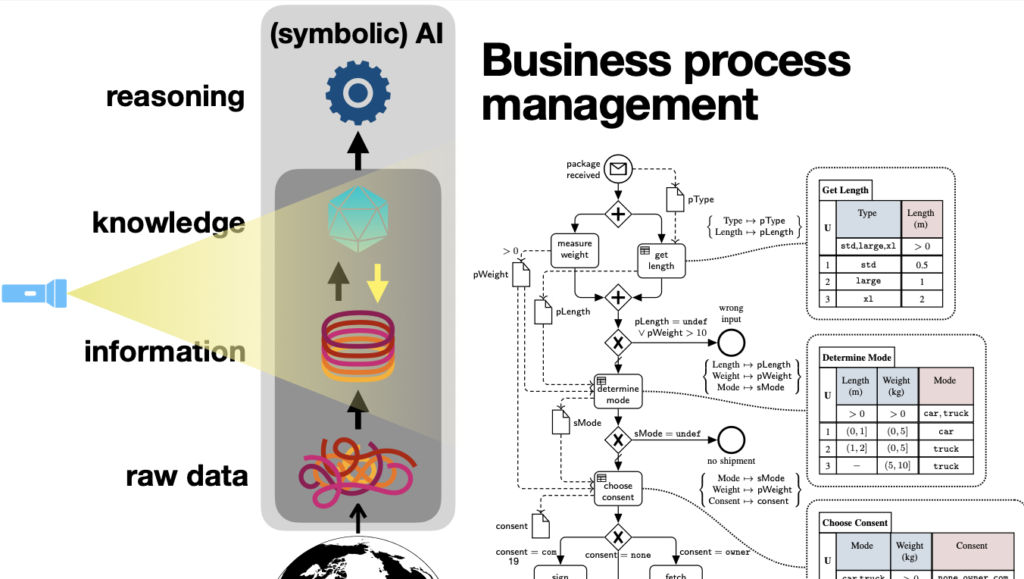
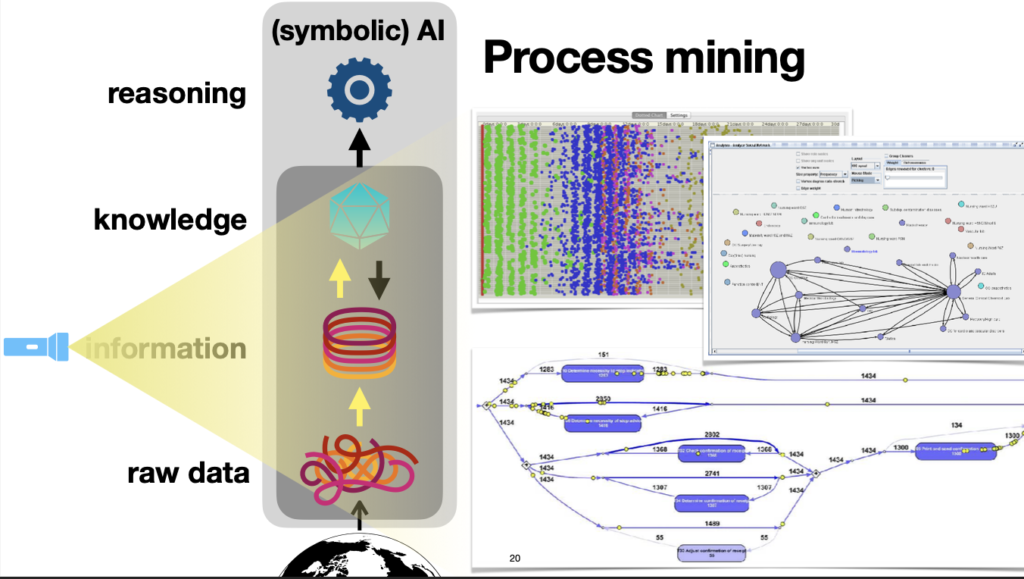
Research activities:
- Integrated languages for processes, data, and decision making
- Flexible approaches to BPM
- Data-aware process verification
- Reactive and predictive monitoring
- Extraction of process logs from data
- Conformance checking
- Identification of deviations
Collaborations: RWTH Aachen, TU Eindhoven, Univ. Twente, TU Munich, Technion Haifa, Univ. Tartu, Univ. Melbourne, Univ. Milano and PoliMi
Applications: manufacturing, healthcare, construction
Selected projects:
- PRIN PINPOINT — exPlaInable kNowledge-aware PrOcess INTelligence. Aims at developing a full-fledged set of techniques towards explainable, knowledge-aware process intelligence, to create auditable, verifiable, trustworthy process mining results. 1st ranked in Italy (PE6.7-PE6.10).
- unibz ID SmartAPP — Automated Process Planning in Cyber Physical Production Systems of Smart Factories. Aims at developing a proof-of-concept solution for automated process planning in smart factories.
Reasoning techniques and tools at KRDB
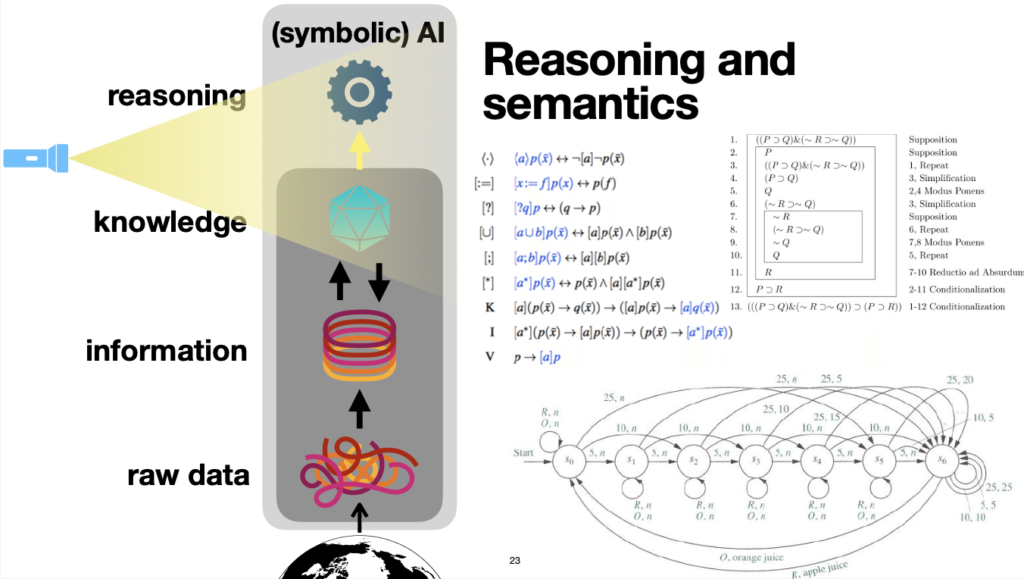
Research activities:
- Reasoning over ontologies
- Intelligent query answering
- Temporal reasoning
- Automated planning
- Formal verification of processes with data
- Reasoning over conceptual models
- Epistemic and agent-based reasoning
Collaborations: Sapienza Rome, Univ. Milano, Rice Univ., Birkbeck London, Univ. Liverpool
Applications: in all domains
Selected projects:
- EU FP6 ACSI — Artifact-centric Service Interoperation. Developed a data-centric service interoperation framework, relying on techniques for formal verification of data-aware processes. 5 academic and 3 industrial partners.
- PRIN HOPE — High quality Open data Publishing and Enrichment. Aims at developing an innovative methodology and associated tools for managing privacy-preserving open data, relying on advanced reasoning services. 4 Italian universities.
